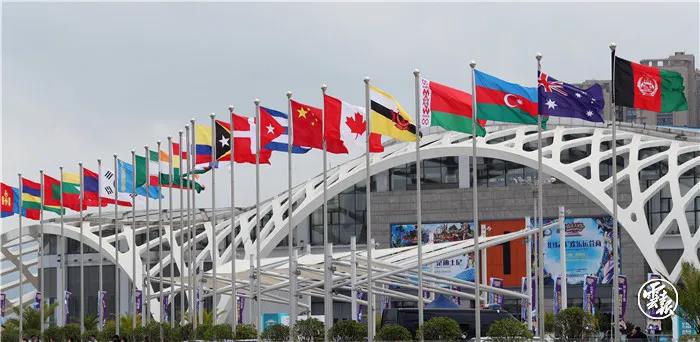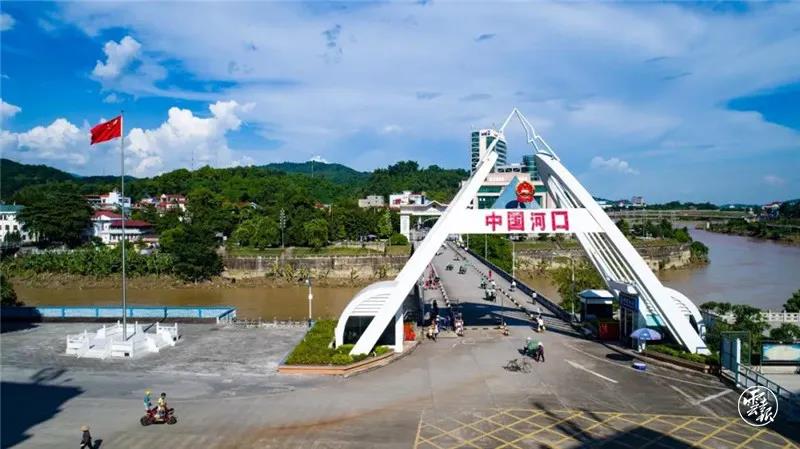Int’l traders discuss RCEP’s coming into effect
The Regional Comprehensive Economic Partnership (RCEP) came into effect on January 1 in the first batch of 10 countries, six ASEAN members and China, Japan, New Zealand and Australia.
The international traders in Yunnan province and beyond held that RCEP will further boost global confidence in economic recovery, while injecting vigor into regional growth and the world’s stability and prosperity.

Yunnan's first RCEP certificate of origin is issued January 1 at Kunming Customs. (Photo/Yunnan Daily)
Tapping potential for opening up, cooperation
The RCEP’s coming into effect is said to have conveyed a striking signal of opening up and cooperation. Trade facilitation will improve, international trade and investment will increase, and global economy will recover.
“Yunnan and New Zealand cooperated a lot in trade and culture, and consumers in the province favored the diary produces, wine, beverages, sea food and meat imported from New Zealand,” said Zhao Ziheng, director of the Yunnan office, New Zealand China International Trade Association.
With the RCEP coming into effect, the New Zealand-Yunnan trade will see great potential be tapped. As for agro-products, they will be cleared faster at customs and reach consumers at more reasonable prices.
“This is absolutely something delightful,” said Li Yinning, a Malaysian national at the Crowne Plaza Kunming Centre Hotel, who has kept an eye on RCEP’s progress. Li added that tariff cuts will cheapen products and encourage consumption, lowering the cost of running a hotel.

Profile of the Kunming Dianchi International Convention and Exhibition Center. (Photo/Yunnan Daily)
Adding momentum to regional development
As an all-round, modern and mutually beneficial pact for free trade, the RCEP was taken as something that would deeply integrate the regional industry chain and add momentum to regional cooperation and growth.
“The RCEP will allow the China-Laos railway to better serve the ASEAN market, and the logistic performances among the RCEP members will see improvement,” said Yao Bin, chairman of the Lao Chinese Chamber of Commerce.
With Laos growing into an international freight hub, the Lao specialties will travel via the China-Laos railway to the neighboring countries, enjoying the RCEP preferential policies and giving impetus to the Lao economy.
“The RCEP’s taking effect is good news and brings the members opportunities for development,” said Nat Vimonchandra, commercial consul at the Royal Thai Consulate-General in Kunming. Covering myriad aspects of trade liberalization and investment facilitation, the agreement will inject vigor into the gloomy global economy amid Covid rages.
“Yunnan flowers are favored by Thai nationals, while the Thai rice and fruits sell well in the Chinese province,” noted the Thai business consul, adding the RCEP cuts in tariffs and other trade barriers will facilitate Thailand-China economic ties.
Nat said the RCEP pact will allow more investment to go to the Eastern Economic Corridor and other Thai projects, which can be further connected with the China-proposed Belt and Road Initiative for regional growth.

An event is held for international experts to share ideas on the RCEP in December 2020. (Photo/Yunnan Daily)
Yunnan firms seizing business opportunities
The RCEP agreement features an unprecedented level of openness for trade and investment, which is taken as opportunities for increasing competitiveness of Yunnan businesses.
“The RCEP’s coming into effect will optimize the country-of-origin rules for corporate production and trade efficiency,” said Wu Jianxun, deputy general manager of Yunnan Tin Industrial Company, citing the independent declaration of origin by approved exporters under the RCEP.
The Yunnan tin firm trades with 13 RCEP members, and by upgrading its global supply chain and seizing the RCEP opportunities, it aims to serve Yunnan businesses in logistics, global trade and competitiveness.
“To a large degree, the RCEP will reduce trade cost and benefit the Yunnan follower farmers and firms,” said Fu Zhaotian, general manager of the Yunnan Shoumeng Agro-technology, whose clients mostly come from Myanmar, Cambodia and Vietnam.
Fu noted that the RCEP speeded up the customs clearance for flowers and other fresh produces, adding his company has ordered two containers of the cold-chain freight trains on China-Laos railway for flower exports.
Yuan Yumei, a staffer with the Yunnan-based Wuzhou e-commerce firm, said the RCEP will facilitate flows of people, goods, funds and information, giving impetus to cross-border e-commerce between the province and its neighbors of Thailand, Malaysia, Vietnam and more.

The Hekou land port near a China-Vietnam boder section in south Yunnan province. (Photo/Yunnan Daily)
Reporting by Liu Ziyu, Han Chengyuan, Wang Jingzhong, Zi Jianfei, Li Ling and Yang Xuan (Yunnan Daily); Trans-editing by Wang Shixue